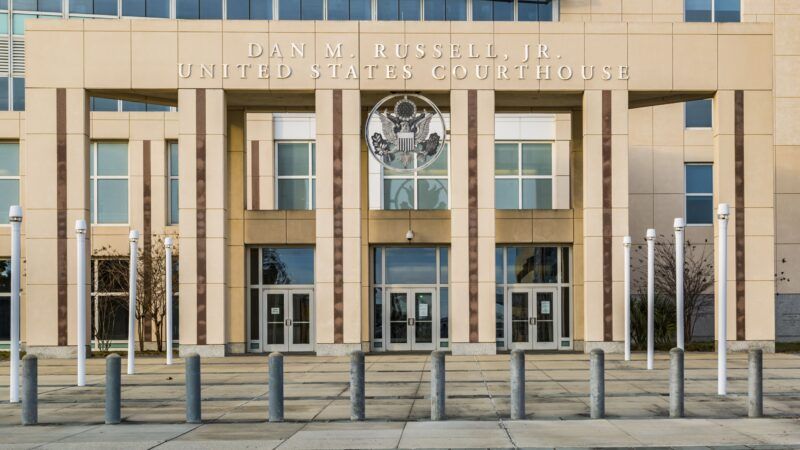Federal Appeals Court Upholds Mississippi's Jim Crow–Era Felon Voting Ban
"In short, 'cruel and unusual' is not the same as 'harmful and unfair,'" the court wrote.

On review, the U.S. Court of Appeals for the 5th Circuit has upheld Mississippi's lifetime felon disenfranchisement law, which ranks among the harshest in the nation, and reversed a panel decision last year that found it violated the Eighth Amendment of the Constitution.
The 5th Circuit ruled in a 13–6 decision Thursday that Mississippi's disenfranchisement scheme was not punishment, and even if it was, it wasn't cruel or unusual. To find otherwise, Judge Edith Jones wrote in the majority opinion, "even as to a limited set of offenders, is at odds with the Supreme Court's and other courts' decisions, would thwart the ability of the State's legislature and citizens to determine their voting qualifications, and would require federal courts overtly to make legislative choices that, in our federal system, belong at the State level."
It would be logically incoherent, Jones wrote, to find felon disenfranchisement cruel and unusual when the death penalty has survived numerous Eighth Amendment challenges, and it would call into question a host of other restrictions put on felony offenders, such as jury service and running for public office.
"In short, 'cruel and unusual' is not the same as 'harmful and unfair,'" Jones wrote, "and it is only that limited type of criminal statute that violates the Eighth Amendment."
The 5th Circuit joins several other federal appeals circuits that have upheld felon disenfranchisement laws. In 2020, the 11th Circuit ruled that Florida's laws requiring felony offenders to pay off all their fines and fees before they could regain their voting rights was constitutional, reversing a panel decision that found the requirement violated the Equal Protection Clause of the 14th Amendment.
But Mississippi's felon disenfranchisement scheme is so harsh, and so indisputably rooted in Jim Crow discrimination, that civil rights advocates were hopeful they could differentiate it from other states.
The state imposes a lifetime voting ban for those convicted of certain crimes. The drafters of Mississippi's 1890 constitution admitted that they intentionally chose a list of crimes they believed most likely to lead to the disenfranchisement of black residents, such as forgery and bigamy. Rape and murder were not added to the list, which now includes 22 offenses, until 1968.
Last August, a panel of 5th Circuit judges blocked Mississippi's felon disenfranchisement law in a 2–1 ruling, finding that the state's lifetime voting ban for those convicted of certain crimes constituted cruel and unusual punishment under the Eighth Amendment.
Mississippi Republican Attorney General Lynn Fitch then successfully petitioned the 5th Circuit for an en banc rehearing.
A broad coalition of civil liberties groups and think tanks filed an amicus brief urging the 5th Circuit to uphold the panel's ruling, including the American Civil Liberties Union, the Brennan Center for Justice, the Cato Institute, and Reason Foundation, the nonprofit that publishes Reason.
Those groups argued that the 5th Circuit panel correctly diagnosed the constitutional problems with Mississippi's "mandatory, permanent, and effectively irrevocable" voting ban for certain felony offenders.
"Its historical origins in noxious, intentional racial discrimination offend the dignity of the individual and society," the brief says. "Its mandatory nature and lack of an accessible, non-arbitrary path to reentry make it functionally irrevocable—even for minor offenses that carry short terms of imprisonment, like writing a bad check for $100—and thus grossly disproportionate."
The Mississippi Attorney General's Office argued that the panel incorrectly ruled that the voting ban was punishment. "Under Supreme Court precedent, Section 241 of the Mississippi Constitution is a nonpunitive voting regulation," the office wrote, pointing to widespread and mostly unconstrained felon voting laws in other states. "Third, even if disenfranchisement were a punishment, it is not cruel and unusual."
A majority of the full 5th Circuit agreed emphatically with Fitch and rejected all of the reasoning of the panel, civil rights groups, and dissenters from the majority opinion.
"The paramount lesson of the Constitution and [prior case law] is that the changes sought by Plaintiffs here can and must be achieved through public consensus effectuated in the legislative process, not by judicial fiat," Jones wrote.


Show Comments (29)